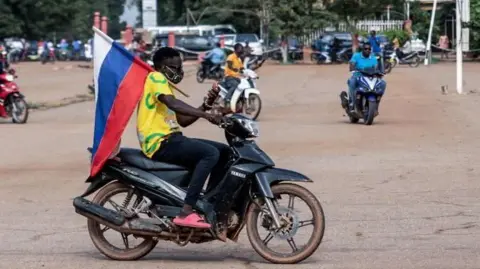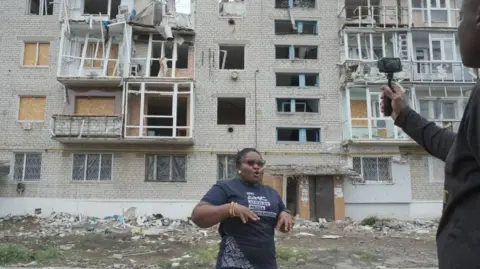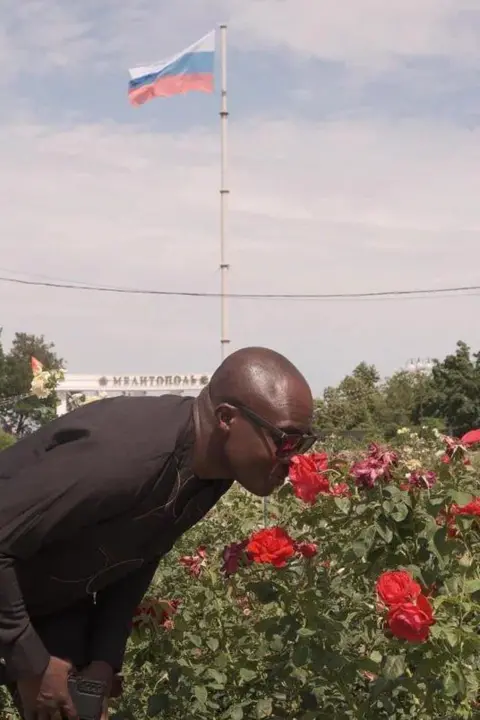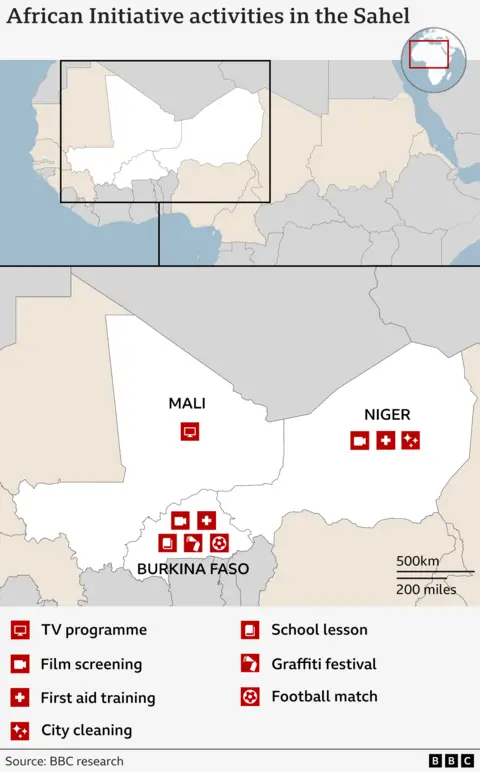Building influence through war ‘tours’ and graffiti

 AFP
AFPYoung soccer players listen to the Russian national anthem before the game. Nearby, artists paint a portrait of Russian President Vladimir Putin on a wall during a graffiti festival.
Welcome to Burkina Faso, one of the African countries where Russia is developing its operations to gain influence.
Evidence obtained by the BBC shows that Russia uses the media and culture to attract African journalists, activists, and students while spreading misleading information.
The events are promoted by the African Initiative, a newly established Russian media organization that describes itself as a “bridge of knowledge between Russia and Africa”. It inherited structures established by the disbanded Wagner group and experts are believed to have links with Russian security forces.
Incorporated in September 2023, a month after Wagner’s leader Yevgeny Prigozhin died in a plane crash, the African Initiative welcomed former employees of his disbanded companies.
Its efforts are mainly focused on the three military-controlled countries of Mali, Niger and Burkina Faso.
After the latest coup, these West African nations have distanced themselves from Western allies like France, criticizing their failed interventions against jihadist groups and the colonial legacy. Instead they turned to Russia.
In addition to cultural events on the ground, the African Initiative maintains a news website with news in Russian, English, French, and Arabic, as well as a video channel and five Telegram channels, one of which has nearly 60,000 subscribers.
Some of the Telegram channels were “recycled” from older ones set up by groups linked to Wagner. They were the first to promote the Russian Ministry of Defense’s Africa Corps, which replaced Wagner’s West African division.
Pro-Kremlin narratives and misinformation, especially about the United States, abound.
News on the African Initiative website suggests without evidence that the US is using Africa as a production and testing site for bio-weapons, building on the Kremlin’s long-discredited disarmament campaigns.
One story agrees with the Kremlin’s unsubstantiated claims about US bio-labs being moved from Ukraine to Africa. Another insists without evidence that the US bio-labs on the continent are expanding, saying that “under the foundation of research and humanitarian projects, the African continent is becoming a testing ground for the Pentagon”, suggesting that secret biological tests are being carried out.
Although Prigozhin’s propaganda efforts were mainly aimed at France, the African Initiative “targeted the Americans to a large extent,” said researcher Jedrzej Czerep, head of the Middle East and Africa Program at the Polish Institute of International Affairs. “It’s very anti-American.”
 Russian (Telegram Channel)
Russian (Telegram Channel)In June, a group of bloggers and journalists from eight countries were invited on a seven-day “press tour” of the Russian-controlled areas of Ukraine. The trip was organized by Russian state media and Russian officials authorized by the West, and the journalists visited the headquarters of the African Initiative in Moscow.
“Africa was not getting much information [about the war],” Raymond Agbadi, a Ghanaian blogger and scientist who studied in Russia and took part in the “press tour”, told the BBC. “Any information we were getting was not convincing enough to understand what the war was really about.”
American activist Jackson Hinkle, a supporter of Russian President Vladimir Putin who has spread many false claims about Ukraine, was also on the trip.
After visiting Moscow, the journalists traveled 1,250 kilometers (780 miles) to the Ukrainian port city of Mariupol in the Donetsk region. Then they went to the towns of the Zaporizhzhia region – all the places that Russia took at the beginning of its all-out invasion of Ukraine.
Throughout the visit, the journalists were accompanied by Russian officials and accompanied by Russian soldiers in cars marked with Z – a symbol of Russia’s invasion of Ukraine.
In May, the African Initiative organized a separate “press trip” to Mariupol hosted by Russia for a delegation of bloggers from Mali.
Journalists’ press trips are a widely used tool to try to sell a country’s views. But even though “the Western media do a lot of training that goes on [for journalists] to report on important topics that have become global concerns, Russia uses this guided tour as a way to broadcast certain news,” said Beverly Ochieng, a senior analyst at Control Risks and the Center for Strategic and International Studies, noting that China is planning a similar visit.
Having African journalists report on their trip gives “an impression of authenticity” because they are “reaching audiences in languages they know”, rather than looking like it is part of “a wider campaign used to portray Russia in a positive light”, said Ms Ochieng.
In the stories published since the trip, African journalists refer to the Ukrainian cities controlled by Russian troops as “conflict areas in Russia” and quote authorities installed in Russia, echoing the propaganda of the Russian government and presenting the Kremlin’s view of Ukraine’s borders.
In an article published on JoyOnline, an English-language website operated by Multimedia Group, Ghanaian journalist Ivy Setordjie writes that the Ukrainian region of Zaporizhzhia [whose capital is under Ukrainian control]”found in southern European Russia.”
He tells the BBC that he does not agree that the regions have been taken illegally by Russia, confirming that his reports reflect his judgment and are “not directed” at the country.
 mariupol-news.ru
mariupol-news.ruBesides the media visit, local organizations under the African Initiative in the Sahel region of West Africa have been involved in public relations efforts aimed at improving Russia’s image.
The BBC monitored the African Initiative’s Telegram channels and Facebook pages, where videos, photos, and reports of their work on the ground were shared.
In Burkina Faso, we received reports of a soccer match where the Russian national anthem was played, “friendship lessons” in schools where students were taught about Russia, a Soviet karate “sambo” competition, first aid workshops for citizens and the police. , and a graffiti festival where participants painted Russian President Vladimir Putin and former Burkina Faso leader Thomas Sankara, all sponsored by the African Initiative.
The footage also shows members of the African Initiative distributing groceries to locals and a neighborhood view of the Wagner-based documentary The Tourist, about a group of Wagner teachers in the Central African Republic, where Wagner and his shoots were made. helping the government fight the rebels for several years.
“The first idea about the African Initiative was to erase everything that Prigozhin had built and replace it with something new. Later in the process, it seemed that it made sense to reuse all the material that was already there,” said researcher Mr. Czerep of the Polish Institute of International Affairs.
The FSB, the Russian Federal Security Service, is playing a key role in the new organization, he notes. The head and chief organizer of the African Initiative is Artyom Kureyev, who has been identified by Russian experts as an agent of the Russian Federal Security Service. Mr Kureyev is linked to the Valdai Club, a Moscow think tank close to President Putin.
The African Initiative website lists Anna Zamaraeva, a former press officer at Wagner, as deputy editor-in-chief.

Viktor Lukovenko, known as one of Prigozhin’s “political experts”, founded the Burkina Faso office of the African Initiative but left this position in recent months. A former Russian citizen with a life of crime, Mr Lukovenko served five years in prison for attacking a Swiss citizen who later died in Moscow.
We have contacted African Initiative for comment. Its office in Moscow confirmed that it had received our questions but did not respond. We also contacted the Russian government but did not receive a response.
In February, in response to a report by the US State Department, an article on the African Initiative’s website said that its editorial board “stresses that its purpose is to spread information about Africa in Russia and to make Russia known in African countries”, providing “a variety of. Africans have the opportunity to be heard, including their criticism of Western countries”.
Meanwhile, the organization continues to strengthen its reach in the Sahel. In the last week of August, about 100 students in Burkina Faso attended a lecture on training opportunities in Russia.
“I learned about Russian culture and relations between our governments,” said a smiling young man wearing a T-shirt with the African Initiative logo in a video recorded after the interview.
More on Wagner in Africa:
Source link




